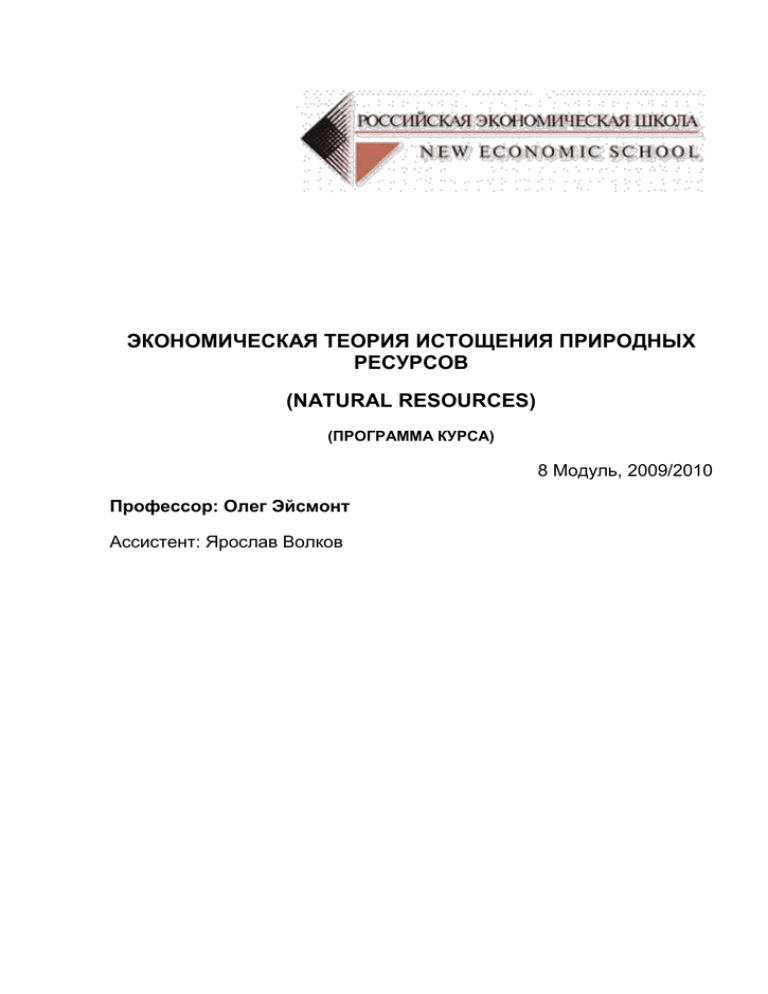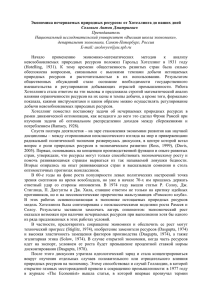Экономическая теория истощения природных ресурсов
advertisement

ЭКОНОМИЧЕСКАЯ ТЕОРИЯ ИСТОЩЕНИЯ ПРИРОДНЫХ РЕСУРСОВ (NATURAL RESOURCES) (ПРОГРАММА КУРСА) 8 Модуль, 2009/2010 Профессор: Олег Эйсмонт Ассистент: Ярослав Волков Основная цель курса - дать студентам представление об особенностях экономической теории, анализирующей процессы добычи, ценообразования и использования ограниченных природных ресурсов, о роли, которую играют ограниченные природные ресурсы в экономическом развитии общества. Предполагается знание студентами магистерского курса по макро- и микроэкономике. Курс включает 14 лекций и 6 семинарских занятий. В середине курса проводится промежуточный экзамен. Курс завершается итоговым экзаменом. Окончательная оценка складывается из оценки за итоговый (70%) и промежуточный (30%) экзамены. Базовый учебник, покрывающий около 60% курса, - Dasgupta, P.S., and G.H. Heal. "Economic Theory and Exhaustible Resources", Cambridge University Press, 1979. Дополнительная литература приведена в конце каждого раздела. The main goal of the course is to give students the notion of the economic theory which analyzes processes of natural resources extraction, pricing, and consumption, of the role that exhaustible natural resources play in economic development of modern societies. It is assumed that the students are familiar with the graduate course in macroeconomics. The course includes 14 lectures, 6 seminars, and a midterm exam. Final exam concludes the course. The final grade is the weighted average of the final (70%) and of midterm exam (30%) exams. The base textbook which covers about 60% of the course - Dasgupta, P.S., and G.H. Heal. "Economic Theory and Exhaustible Resources", Cambridge University Press, 1979. Additional literature is given at the end of each section. 2 1. Основы теории невозобновляемых природных ресурсов (3 лекции). Краткая история развития экономической теории природных ресурсов от Мальтуса до Хотеллинга. Модель истощения ограниченных природных ресурсов Хабберта. Грозит ли человечеству глобальная катастрофа? “Пределы роста” как пример неомальтузианства. Правило Хотеллинга. Нулевые издержки добычи природного ресурса. Ненулевые издержки добычи природного ресурса. Эксплуатация месторождений, различающихся издержками добычи. Влияние альтернативного неисчерпаемого ресурса на эксплуатацию истощаемого природного ресурса. Разведка и прирост запасов природных ресурсов. Издержки открытия новых месторождений и рента за истощение. Meadows, D.H., et.al. “The Limits to Growth”, New York: Universe Books, 1972. Dasgupta, P.S., and G.H. Heal. "Economic Theory and Exhaustible Resources", Cambridge University Press, 1979. Pindyck R., "The Optimal Exploration and Production of Nonrenewable Resources", Journal of Political Economy, 1978, vol. 86, 841-861. Swierzbinsky J.L., and R. Mendelsohn, "Exploration and Exhaustible Resources: The Microfoundations of Aggregate Models", International Economic Review, 1989, vol. 30, 175-186. Symposium on the Economics of Exhaustible Resources, The Review of Economic Studies, 1974. 2. Неопределенность и эксплуатация природных ресурсов (2 лекции). Неопределенность запаса природного ресурса. Неопределенность издержек производства альтернативного неисчерпаемого ресурса. Неопределенность времени освоения альтернативного неограниченного ресурса. Неопределенность цен природного ресурса и теория реальных опционов. Dasgupta P., and J. Stiglitz, "Resource Depletion Under Technological Uncertainty", Econometrica, 1981, vol. 49, 85-104. Stiglitz J., and P. Dasgupta, "Market Structure and Resource Extraction Under Uncertainty", Scandinavian Journal of Economics, 1981, vol. 83, 318-333. 3. Несовершенная конкуренция в теории истощаемых природных ресурсов (2 лекции). Монополия на владение запасом невозобновляемого природного ресурса. Олигополия. Монополия на природный ресурс и существование альтернативного неограниченного ресурса. Картель и конкурентные владельцы природного ресурса. Ограничения на производственные мощности конкурентных владельцев. Пример ОПЕК. Dasgupta, P.S., and G.H. Heal. "Economic Theory and Exhaustible Resources", Cambridge University Press, 1979. Groot F., C. Withagen and A. de Zeeuw, "Note on the Open Loop von Stackelberg Equilibrium in the Cartel Versus Fringe Model", The Economic Journal, 1992, vol. 102, 1478-1484. 3 Newbery D., "Oil Prices, Cartels, and the Problem of Dynamic Inconsistensy", The Economic Journal, 1981, vol. 91, 617-646. 4. Налогообложение невозобновляемых природных ресурсов (1 лекция). Налог на продажи. Экспоненциально растущий налог. Постоянный налог. Влияние налоговой политики на благосостояние собственников природных ресурсов и потребителей. Налог на прибыль. Налог на прирост капитала. Налоговая скидка на истощение. Отчисления собственникам природных ресурсов. Влияние налога на оптимальную эксплуатацию истощаемого природного ресурса. Эксплуатация одного месторождения истощаемого природного ресурса несколькими экономическими агентами и оптимальное налогообложение. Налогообложение природных ресурсов в России. Dasgupta, P.S., and G.H. Heal. "Economic Theory and Exhaustible Resources", Cambridge University Press, 1979. 5. Эмпирический анализ истощения природных ресурсов (1 лекция). Выполняется ли на практике правило Хотеллинга? Принцип стоимости Хотеллинга и его эмпирическая проверка. Berck P., and M. Roberts, "Natural Resource Prices: Will They Ever Turn Up?", Journal of Environmental Economics and Management, vol. 31, 65-78, 1996. 6. Общественное производство с использованием истощаемого природного ресурса (3 лекции). Экономический рост при использовании ограниченного природного ресурса. Постоянная норма накопления. Ограниченность природных ресурсов и проблема справедливости. Рациональное использование природных ресурсов во времени. Роль этических систем в определении справедливого распределения богатства между различными поколениями (утилитаризм, эгалитаризм, элитаризм, либертарианизм). Оптимальное истощение невозобновляемых природных ресурсов: утилитарный и эгалитарный подходы. Правило Хартвика. Dasgupta, P.S., and G.H. Heal. "Economic Theory and Exhaustible Resources", Cambridge University Press, 1979. Hartwick J., "Intergenerational Equity and the Investing of Rents from Exhaustible Resources", American Economic Review, 1977, vol. 67, 972-991. Rawls, J. "A Theory of Justice", Harvard University Press, Cambridge, MA, 1971. Solow, R.M. "Intergenerational Equity and Exhaustible Resources", Review of Economic Studies, Symposium on the Economics of Exhaustible Resources, 1974. Solow R., "On the Intergenerational Allocation of Natural Resources", Scandinavian Journal of Economics, 1986, vol. 88, 143-154. Symposium on the Economics of Exhaustible Resources, The Review of Economic Studies, 1974. 4 7. Эксплуатация природных ресурсов в условиях открытой экономики (1 лекция). “Голландская болезнь”, исторические примеры ее проявления. Модель «голландской болезни». Болезнь ли это? Краткосрочные и долгосрочные последствия “голландской болезни”. “Голландская болезнь” и деиндустриализация экономики. Эмпирические оценки «голландской болезни». Corden W., "Booming Sector and Dutch Disease Economics: Survey and Cosolidation", Oxford Economic Papers, 1984, vol. 36 (3), 359-380. Dasgupta P., Eastwood R., G. Heal, "Resource Management in a Trading Economy", Quarterly Journal of Economics, 1978, vol. 92, 297-306. Sachs J.D., Warner A.M., “Natural Resource Abundance and Economic Growth”, NBER Working Paper No. 5398, 1995. 8. Природные ресурсы, система национальных счетов и устойчивое развитие (1 лекция). Мера общественного благосостояния. Является ли традиционно измеряемый ВВП мерой общественного благосостояния? Лагранжеан как мера общественного благосостояния. Лагранжеан и чистый национальный продукт. Истощение невозобновляемых природных ресурсов и чистый национальный продукт. Устойчивость развития. Maeler, K.-G. "National Accounts and Environmental Resources", Environmental and Resource Economics, 1991, vol. 1, No 1. Hartwick, J. "Natural Resources, National Accounting and Economic Depreciation", Journal of Public Economics, 1990, vol. 43, 291-304. Vellinga, N., and C. Withagen, "On the Concept of Green National Income", Oxford Economic Papers, 1996, vol. 48, 499-514. Weitzman M., “Pricing the Limits to Growth from Minerals Depletion”, Quarterly Journal of Economics, 1999, May, 691-706. 5 Course Outline 1. Basic Theory of Economics of Exhaustible Natural Resources (3 lectures). A short history of economic theory of natural resources from Malthus to Hotelling. Hubbert model of natural resources depletion. Is forthcoming global catastrophe facing mankind imminent? “Limits to Growth” as an example of Neo-Malthusian theory. Hotelling rule. Zero extraction costs. Nonzero extraction costs. Exploitation of natural resources with different extraction costs. Exploitation of exhaustible natural resource when alternative inexhaustible resource is available. Exploration, resource additions and exhaustion rent. Meadows, D.H., et.al. “The Limits to Growth”, New York: Universe Books, 1972. Dasgupta, P.S., and G.H. Heal. "Economic Theory and Exhaustible Resources", Cambridge University Press, 1979. Pindyck R., “The Optimal Exploration and Production of Nonrenewable Resources”, Journal of Political Economy, 1978, vol. 86, 841-861. Swierzbinsky J.L., and R. Mendelsohn, “Exploration and Exhaustible Resources: The Microfoundations of Aggregate Models”, International Economic Review, 1989, vol. 30, 175-186. Symposium on the Economics of Exhaustible Resources, The Review of Economic Studies, 1974. 2. Natural Resource Exploitation Under Uncertainty (2 lectures). Uncertainty of natural resource reserves. Uncertainty of production costs of alternative inexhaustible resource. Uncertainty of the time of alternative unlimited resource invention. Uncertainty of natural resource price and real options theory. Dasgupta P., and J. Stiglitz, “Resource Depletion Under Technological Uncertainty”, Econometrica, 1981, vol. 49, 85-104. Stiglitz J., and P. Dasgupta, “Market Structure and Resource Extraction Under Uncertainty”, Scandinavian Journal of Economics, 1981, vol. 83, 318-333. 3. Imperfect Competition (2 lectures). Monopoly on natural resource reserves. Oligopoly. Monopoly on natural resource when alternative inexhaustible resource is available. Natural resource cartel and competitive fringe. Capacity constraints. OPEC example. Dasgupta, P.S., and G.H. Heal. "Economic Theory and Exhaustible Resources", Cambridge University Press, 1979. Groot F., C. Withagen and A. de Zeeuw, "Note on the Open Loop von Stackelberg Equilibrium in the Cartel Versus Fringe Model", The Economic Journal, 1992, vol. 102, 1478-1484. Newbery D., "Oil Prices, Cartels, and the Problem of Dynamic Inconsistensy", The Economic Journal, 1981, vol. 91, 617-646. 6 4. Taxation of Natural Resources (1 lecture). Sales tax. Exponentially rising tax. Constant tax. Tax policy and welfare of resource owners and consumers. Profit tax. Capital gains tax. Depletion tax allowance. Royalty. Natural resource taxation and optimal resource extraction. Exploitation of a single natural resource deposit by several owners and optimal taxation. Natural resource taxation in Russia. Dasgupta, P.S., and G.H. Heal, "Economic Theory and Exhaustible Resources", Cambridge University Press, 1979. 5. Empirical Analysis of Natural Resources Exhaustion (1 lecture). Is Hotelling rule valid in practice? Hotelling valuation principle and its empirical validation. Berck P., and M. Roberts, "Natural Resource Prices: Will They Ever Turn Up?", Journal of Environmental Economics and Management, vol. 31, 65-78, 1996. 6. Production Using Exhaustible Natural Resources (3 lectures). Economic growth with natural resource as a production factor. Constant savings rate. Natural resource exhaustion and the problem of equity. Rational use of natural resources over time. The role of ethical systems in equitable distribution of exhaustible natural resource consumption between generations (utilitarianism, egalitarianism, elitism). Optimal use of exhaustible natural resources (utilitarian and egalitarian approaches). Hartwick rule. Dasgupta, P.S., and G.H. Heal. "Economic Theory and Exhaustible Resources", Cambridge University Press, 1979. Hartwick J., "Intergenerational Equity and the Investing of Rents from Exhaustible Resources", American Economic Review, 1977, vol. 67, 972-991. Rawls, J. "A Theory of Justice", Harvard University Press, Cambridge, MA, 1971. Solow, R.M. "Intergenerational Equity and Exhaustible Resources", Review of Economic Studies, Symposium on the Economics of Exhaustible Resources, 1974. Solow R., "On the Intergenerational Allocation of Natural Resources", Scandinavian Journal of Economics, 1986, vol. 88, 143-154. Symposium on the Economics of Exhaustible Resources, The Review of Economic Studies, 1974. 7. Exploitation of Natural Resources in an Open Economy (1 lecture). “Dutch disease”, its historical examples. Model of a “Dutch disease”. Is it a “Disease” at all? Short- and long-term effects of the “Dutch disease”. “Dutch disease” and deindustrialization of the economy. Empirical estimates of a “Dutch disease”. Corden W., "Booming Sector and Dutch Disease Economics: Survey and Cosolidation", Oxford Economic Papers, 1984, vol. 36 (3), 359-380. Dasgupta P., Eastwood R., G. Heal, "Resource Management in a Trading Economy", Quarterly Journal of Economics, 1978, vol. 92, 297-306. 7 Sachs J.D., Warner A.M., “Natural Resource Abundance and Economic Growth”, NBER Working Paper No. 5398, 1995. 8. Natural Resources, National Accounting and Sustainable Development (1 lecture). Measure of public welfare. Can traditionally defined GDP serve as a measure of social welfare? Lagrangean as a measure of public welfare. Lagrangean and net national product. Exhaustion of natural resources and net national product. Sustainability of economic development. Maeler, K.-G., "National Accounts and Environmental Resources", Environmental and Resource Economics, 1991, vol. 1, No 1. Hartwick, J. "Natural Resources, National Accounting and Economic Depreciation", Journal of Public Economics, 1990, vol. 43, 291-304. Vellinga, N., and C. Withagen, "On the Concept of Green National Income", Oxford Economic Papers, 1996, vol. 48, 499-514. Weitzman M., “Pricing the Limits to Growth from Minerals Depletion”, Quarterly Journal of Economics, 1999, May, 691-706. 8
